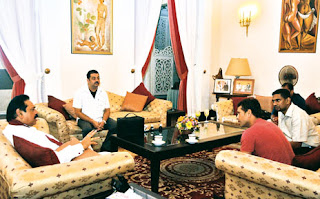Sri Lanka has decided to suspend travel between districts except for essential services. The decision was announced after a discussion with the Presidential Task Force on the Prevention of COVID-19
Addressing the participants of the discussion, Sri Lanka President Gotabaya Rajapaksa said that the government's policy of quarantining the COVID-19 suspected persons at home was successful.
At a discussion held at the President's office today, the President advised to further enhance the programme with the monitoring of Medical Officer of Health, Public Health Inspector, police and Army.
PCR tests are carried out on the 10th day of the quarantine period and the healthy persons will be sent back to normal life after 14 days.
The President further advised all persons who had undergone PCR tests either public or private sectors to be placed under quarantine until the report is received.
President Gotabaya Rajapaksa advised officials to strictly impose isolation and curfew measures to control the spread of the disease.
Chief of the Presidential Task Force on Economic Revival Basil Rajapska said that essential commodities would be distributed as it was done in the previous curfew time.
The monthly allowance of the elderly persons would be delivered to their homes, Basil Rajapaksa said.
The curfew in the entire Western Province will be effective until 5 a.m. on November 9th. The same curfew is valid to Eheliyagoda police division in Ratnapura district, Kurunegala Municipal Council area and Kuliyapitiya police division in Kurunegala district.
Police were ordered not to issue curfew permits during this period.
Ministers Pavithra Wanniarachchi and Ramesh Pathirana, State Ministers Sudarshani Fernandopulle, Channa Jayasumana and Seetha Arambepola and President's Secretary Lalith Weerathunga also participated in the discussion with the members of the Presidential Task Force on the Prevention of COVID-19.









